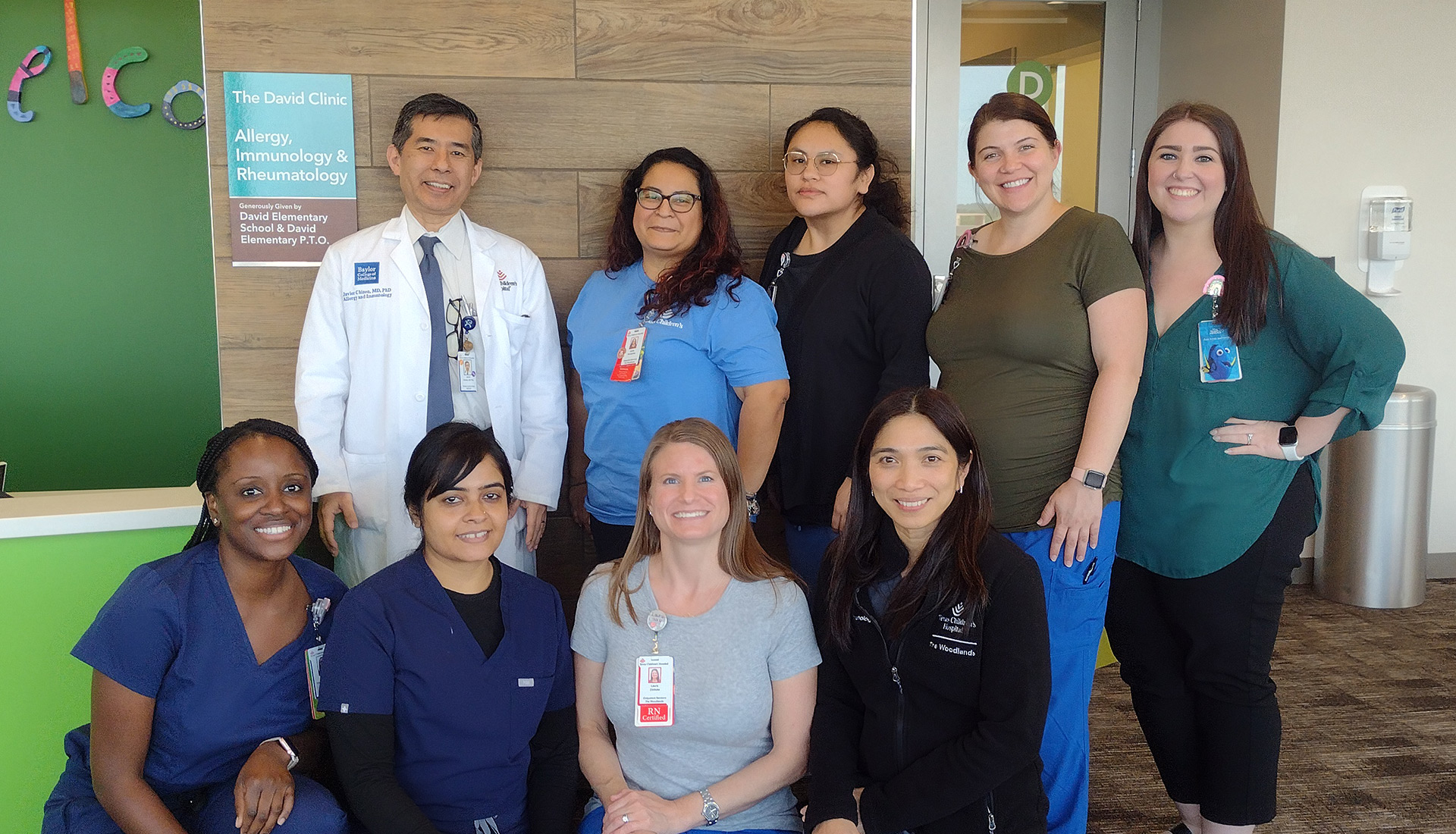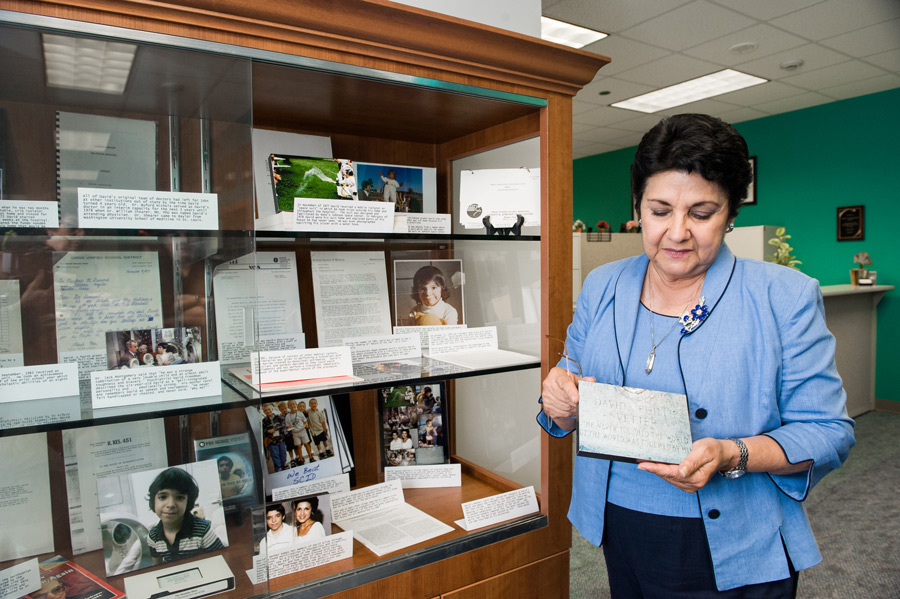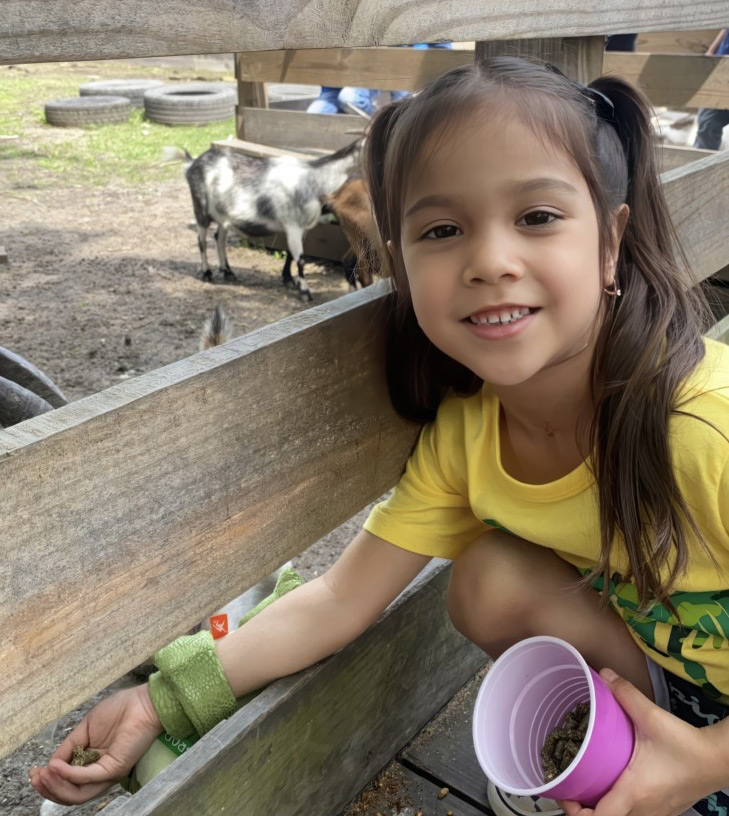


David Vetter, known as Houston’s “bubble boy,” was born at St. Luke’s Hospital in September 1971 with severe combined immunodeficiency (SCID), a rare condition in which patients lack any immune system functionality.
In an extraordinary effort to keep David healthy, he was sealed within a sterile plastic enclosure to protect him from germs and taken to Texas Children’s Hospital within minutes of his birth. He lived his life in this bubble while awaiting a cure.
During David’s life, the only treatment option for SCID was a bone marrow transplant from a perfect sibling-donor match, which did not exist in David’s family. In 1983, he underwent an experimental treatment in which he received a bone marrow transplant from his sister, Katherine, despite her not being a perfect match. This treatment inadvertently introduced the Epstein-Barr virus, which was not well known then, into his system, and he died from lymphoma in February 1984 at 12 years old.
David’s life was short but courageous and full of purpose. His medical journey helped scientists achieve breakthroughs in understanding SCID and advancing treatment.
Today, across all 50 states, newborns are screened for SCID alongside other congenital disorders. Approximately one in 56,000 children are born with this condition annually — about two babies per year in the Houston area. Children with SCID go on to lead normal, healthy lives following bone marrow transplants —even from mismatched, non-familial donors — within their first few months.

“Before, children like David did not have a chance. They rarely lived to see their first birthday,” said Carol Ann Demaret, David’s mother, a Texas Children’s volunteer and a passionate advocate for patients with primary immunodeficiencies and their families. “I am so proud of David, and I get so much joy in seeing other children make it because of him.”
Not only does David leave this powerful legacy, but his namesake clinic is located in his own neighborhood: The Woodlands. As Houston has grown and become more congested, children in David’s community and surrounding areas can receive more convenient care closer to home versus commuting to the Texas Medical Center.

David’s impact extends even further. David Elementary School, also located in The Woodlands, hosts David’s Dream Run each April. Since its launch 28 years ago, this 5K event has raised about $600,000 to support ongoing research and clinical work at the David Clinic and the David Center. The day before the run, David’s Day, is Demaret’s opportunity to visit the school and speak with students about David’s life and the vital mission driving this event.
As for what David would say if he could see the David Clinic now, Demaret is sure he would be proud, too.
“Often, in his bubble, David’s main source of entertainment was TV. He always wanted to watch the news, and he was very focused on stories about children. David was greatly concerned for children who were ill, missing or suffering. He would be so honored to help children with similar conditions to his who are being taken care of by the same institution that took care of him.”
For most parents of healthy children, a child’s fever is not cause to rush to the hospital immediately. The contraction of illnesses is a routine aspect of childhood — a rite of passage associated with attending school, engaging in extracurricular activities and going out in public — and may help build future immunity for similar infections.
For parents of children with immunodeficiencies, however, a fever means an infection that can escalate into a weeks-long recovery or even a life-threatening situation. Because of their impaired immune system, these children lack sufficient defense to fight infections. These conditions can negatively impact their quality of life by significantly limiting their everyday activities and imposing stringent protective measures. Something as mundane as visiting a community swimming pool or being exposed to mold can be dangerous.

Kanya Martinez, the mother of Arianna, 6, knows these challenges well. Throughout her daughter’s first few years, Arianna experienced frequent respiratory infections and recurrent enlargement of cervical lymph nodes with no known cause. In May 2021, at 4 years old, Arianna was referred by her pediatrician to the David Clinic at Texas Children’s Hospital The Woodlands to seek answers.
Named in honor of David Vetter (see sidebar), the David Clinic is dedicated to immunology and allergy care. It serves as an extension of the David Center at Texas Children’s Hospital Texas Medical Center Campus. It complements the ongoing research and clinical work performed there since the 1980s.
The David Clinic is a highly specialized, far-reaching resource conveniently located in The Woodlands, one of Houston’s largest and fastest-growing suburbs. There, leading experts in more than 500 identified types of primary immunodeficiencies diagnose and treat pediatric patients for a wide range of immune system defects — either inborn or acquired by other factors — and allergies, which are the body’s unregulated immune response to contact with certain substances. When needed, these physicians rely on cross-institutional expertise to coordinate patient care and collaborate with immunologists and research teams worldwide.
“One of my favorite things about Texas Children’s is that we are not seeing a doctor in only one clinic or department. Arianna’s primary care physician, her immunologist and infectious disease specialists are working together on her case. Multiple experts are constantly communicating to come up with a plan for my daughter,” Kanya said. “In contrast, my local urgent care would not know where to start in treating Arianna.”
Since the David Clinic opened in October 2016, it has served more than 19,000 local, regional and international patients, making it one of the most productive clinics at Texas Children’s.
Compared to common allergies, severe primary immunodeficiencies are much less frequent. However, as research at the David Clinic has uncovered, immunodeficiencies of lesser degrees of severity may be more common than previously believed.
“Every function in the human body interacts with the immune system, which plays a significant role in peoples’ health. If you cut your finger, you depend on your immune system to protect against bacterial entry and infection. If you have a tumor, you depend on the immune system to recognize it and try to kill it,” said Javier Chinen, MD, PhD, Director of the David Clinic and Senior Faculty in Pediatrics-Allergy and Immunology in the Department of Pediatrics at Baylor College of Medicine. “Through my team’s clinical work and research, I find the identification, characterization and treatment of immunodeficiencies to be highly rewarding in helping to improve the quality of patients’ lives.”
After evaluating Arianna at the David Clinic, Karen Tuano, MD, who oversees Arianna’s care at Texas Children’s, recommended a biopsy of her lymph nodes. Dr. Tuano is an Associate Professor of Pediatrics-Allergy and Immunology at Baylor.
The biopsy and additional microbiological studies revealed the presence of two unusual pathogens: Burkholderia cepacia and Mycobacterium lentiflavum. These findings indicated a defect in the immune system, particularly in neutrophil function.
In a healthy immune system, neutrophils kill pathogens by engulfing and trapping them in a phagosome, a compartment inside cells. There, oxidative burst — the most important function of neutrophils — is produced, acting as a toxic bleach to eliminate pathogens. Lab studies confirmed Arianna’s cells’ lack of oxidative burst, which explained her susceptibility to infections. These results suggested Arianna had chronic granulomatous disease (CGD).
But the mystery deepened. Typically, CGD is associated with five gene defects. Arianna did not have the expected mutations in these five genes. Instead, another gene was defective: protein kinase c-delta (PRKCD). Fewer than 20 individuals with defective PRKCD have been reported worldwide — and all are associated with autoimmune disease.
In collaboration with a team from the Institut Pasteur in France, the medical team confirmed that PRKCD defects were responsible for Arianna’s lack of oxidative burst and that autoimmunity does not need to be present for this diagnosis. Arianna became the first patient worldwide with a PKRCD defect who presented with severe infections but no autoimmunity.
It is complicated and unique cases like this that the David Clinic is well-equipped to handle.
With the proper diagnosis and ongoing care, children with immunodeficiencies enjoy a much better quality of life than they used to and, especially in severe cases, have achieved greater stability and longer-term survival.
For example, Arianna is now able to attend kindergarten. Alongside routine prevention practices, she receives an antibiotic prophylaxis to reduce her risk of infections. She is supervised closely to ensure that any occurring infections or negative side effects of medication are managed early. Because PRKCD defects are associated with autoimmune diseases, it is also important for physicians to monitor Arianna for additional symptoms and the potential development of her condition into leukemia or lupus.
“Without Dr. Tuano and the extended team at Texas Children’s, I don’t know where I’d be — probably still scrambling to find answers about what is going on, and Arianna would still be getting sick,” Kanya said. “The David Clinic team has been so wonderful in guiding us and responding promptly to my questions, and we can never thank them enough.”